Unit 3 Will people have robots 单元复习课件(共24张PPT)
文档属性
| 名称 | Unit 3 Will people have robots 单元复习课件(共24张PPT) |
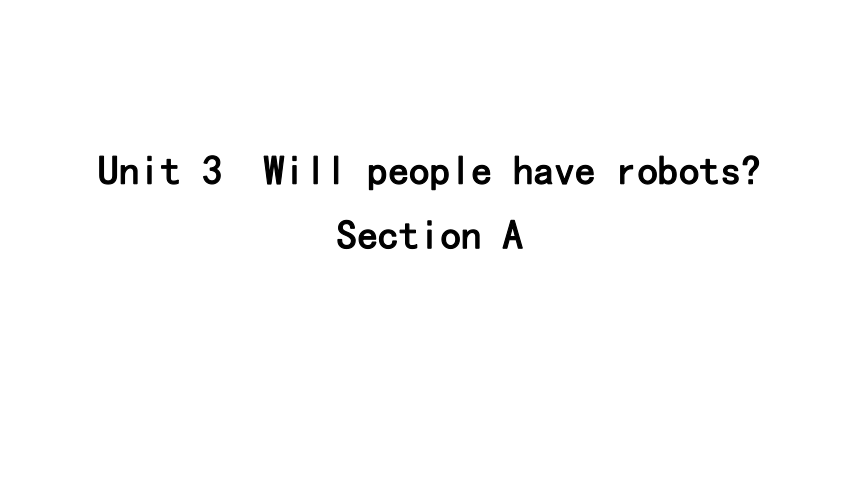
|
|
| 格式 | pptx | ||
| 文件大小 | 180.3KB | ||
| 资源类型 | 教案 | ||
| 版本资源 | 鲁教版 | ||
| 科目 | 英语 | ||
| 更新时间 | 2024-07-06 08:25:22 | ||
图片预览

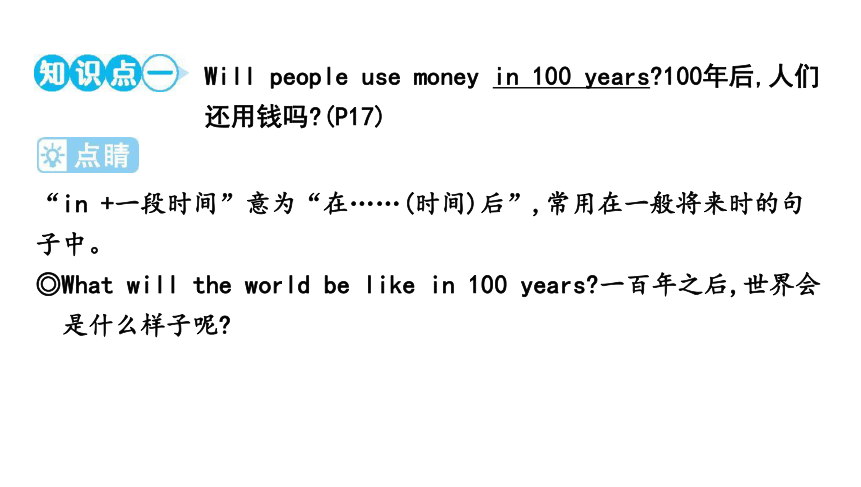
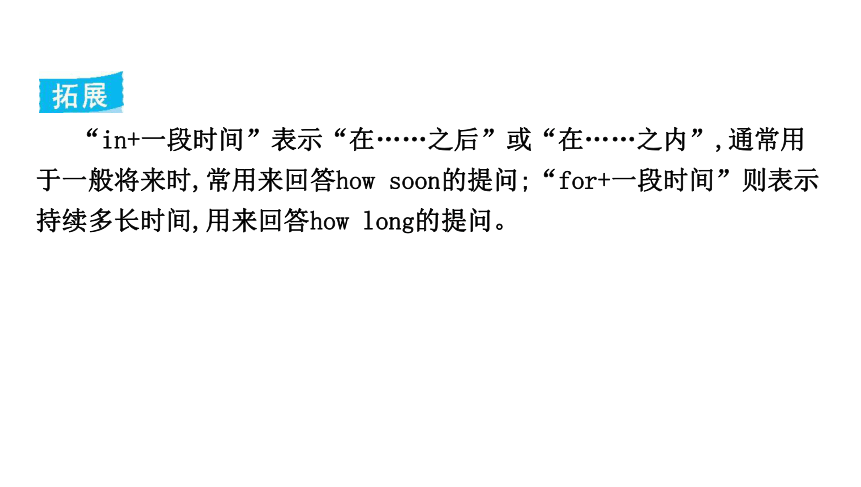
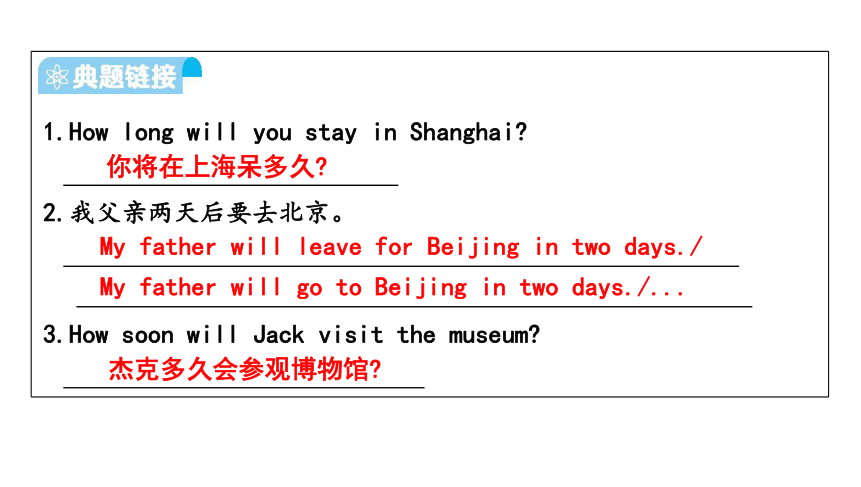
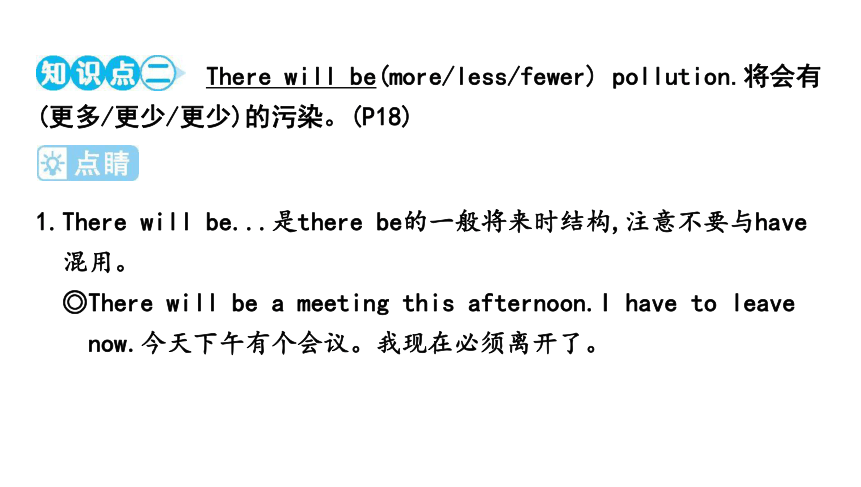
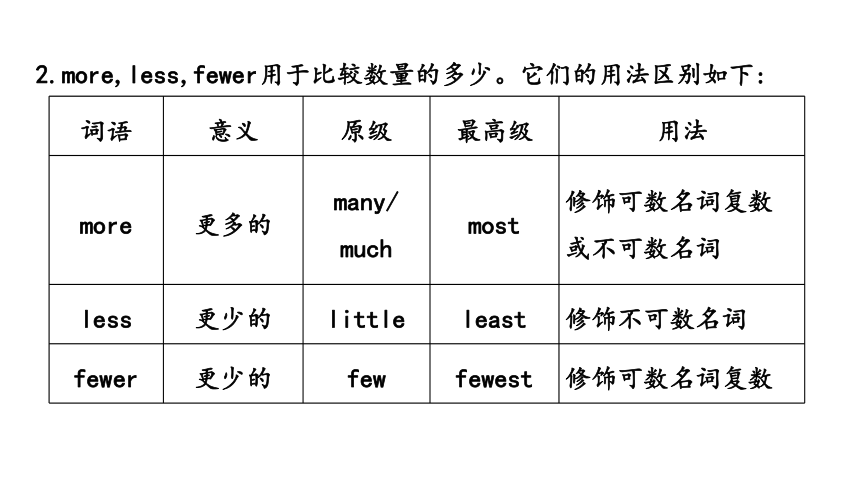
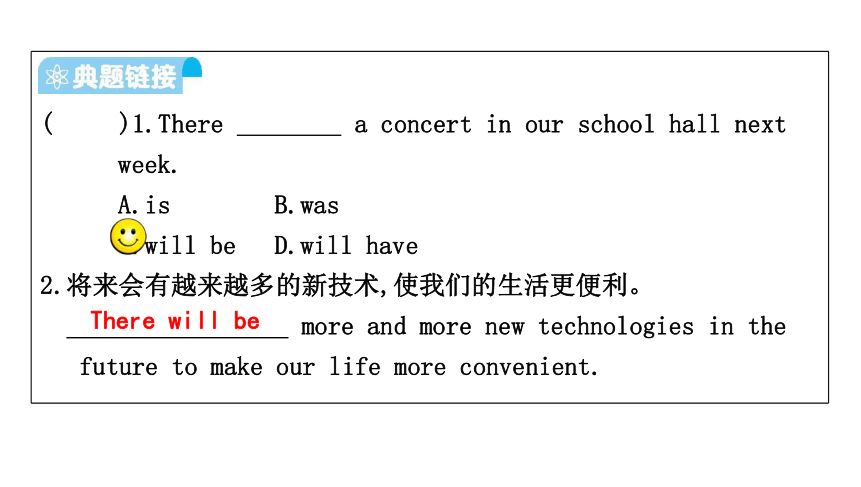
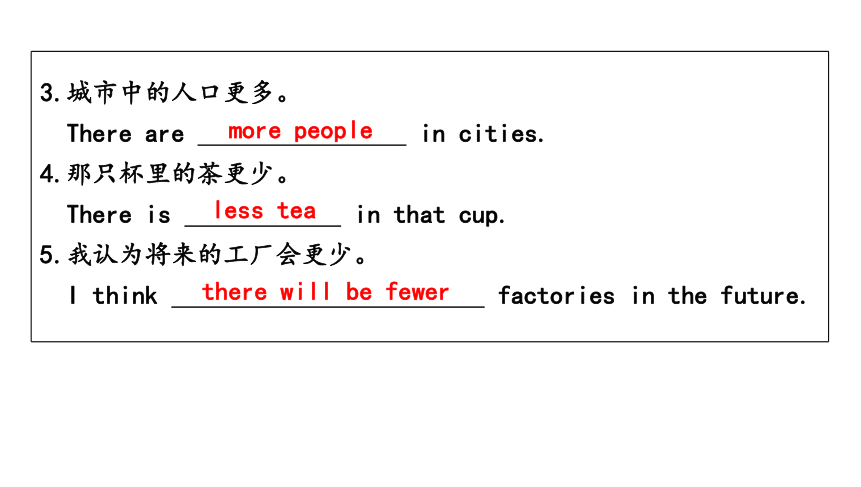
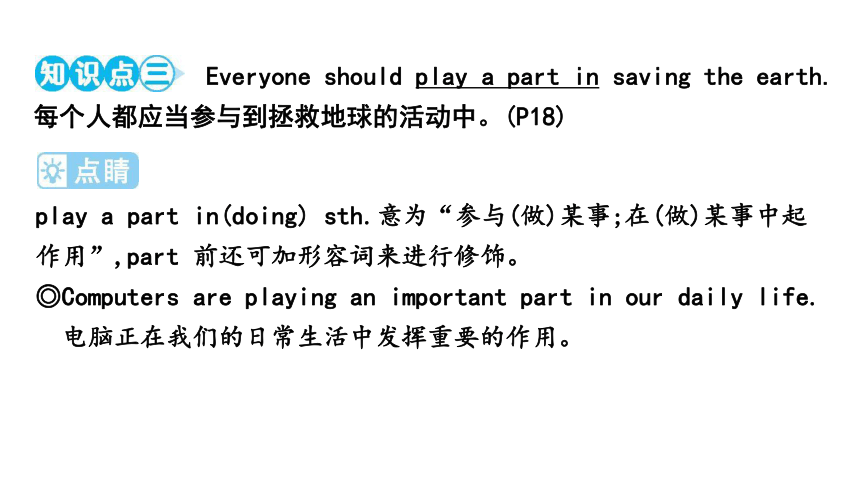
文档简介
(共24张PPT)
Unit 3 Will people have robots
Section A
Will people use money in 100 years 100年后,人们还用钱吗 (P17)
“in +一段时间”意为“在……(时间)后”,常用在一般将来时的句子中。
◎What will the world be like in 100 years 一百年之后,世界会
是什么样子呢
“in+一段时间”表示“在……之后”或“在……之内”,通常用于一般将来时,常用来回答how soon的提问;“for+一段时间”则表示持续多长时间,用来回答how long的提问。
1.How long will you stay in Shanghai
2.我父亲两天后要去北京。
3.How soon will Jack visit the museum
你将在上海呆多久
My father will leave for Beijing in two days./
My father will go to Beijing in two days./...
杰克多久会参观博物馆
There will be(more/less/fewer) pollution.将会有(更多/更少/更少)的污染。(P18)
1.There will be...是there be的一般将来时结构,注意不要与have
混用。
◎There will be a meeting this afternoon.I have to leave
now.今天下午有个会议。我现在必须离开了。
2.more,less,fewer用于比较数量的多少。它们的用法区别如下:
词语 意义 原级 最高级 用法
more 更多的 many/ much most 修饰可数名词复数或不可数名词
less 更少的 little least 修饰不可数名词
fewer 更少的 few fewest 修饰可数名词复数
( )1.There a concert in our school hall next week.
A.is B.was
C.will be D.will have
2.将来会有越来越多的新技术,使我们的生活更便利。
more and more new technologies in the
future to make our life more convenient.
There will be
3.城市中的人口更多。
There are in cities.
4.那只杯里的茶更少。
There is in that cup.
5.我认为将来的工厂会更少。
I think factories in the future.
more people
less tea
there will be fewer
Everyone should play a part in saving the earth.每个人都应当参与到拯救地球的活动中。(P18)
play a part in(doing) sth.意为“参与(做)某事;在(做)某事中起作用”,part 前还可加形容词来进行修饰。
◎Computers are playing an important part in our daily life.
电脑正在我们的日常生活中发挥重要的作用。
辨析:play a part in,join与take part in
play a part in 意为“参与(某事)”,此用法相当于take part in;还可表示演一个角色或起某个作用,后跟名词、代词或v.-ing形式作宾语
join 表示加入某一组织、党派或社会团体,从而成为其中一员,后常跟某个组织或人称代词作宾语
take part in 指参加某项工作、活动、运动,并发挥积极作用
1.咱们参与这个问题的讨论吧。它很有趣。
Let’s the question.
It’s interesting.
2.我去年加入了网球俱乐部。
I the tennis club last year.
3.我没参加篮球比赛。
I didn’t the basketball game.
play a part in discussing
joined
take part in
Section B
Today there are already robots working in factories.现在已经有了在工厂工作的机器人。(P21)
该句为“There be+主语+doing sth.”结构,句意为“有正在做某事的某人(某物)”或“有某人(某物)正在做某事”,强调某动作正在
进行。
◎Look!There is a dog running after a cat in the garden.看!
花园里有一条狗在追一只猫。
名词或代词后面有使用动词不定式to do的情况,这种情况下,不定式修饰前面的名词或代词。
◎There are many other interesting things to do in life.生活
中还有很多有趣的事可做。
1.There are some kids (play) soccer on the ground.
2.Is there anything (eat) in the fridge
3.河里有一些人在游泳。
some people in the river.
playing
to eat
There are
swimming
However,they agree it may take hundreds of years.然而,他们一致认为这可能需要几百年的时间。(P21)
1.agree作动词,意为“同意,赞同”,名词形式为agreement,反义词是
disagree。agree to do sth.意为“同意做某事”。
◎She agreed to buy this book.她同意买这本书。
agree的其它用法:
(1)agree with sb.意为“同意某人的看法或者想法”。
◎I am afraid I can’t agree with you.恐怕我不能同意你的看法。
(2)agree to sth.意为“同意(计划、安排、建议)”。
◎Do you think he’ll agree to our proposal 你认为他会同意我
们的提议吗
2.hundreds of意为“数百……”。当hundred,thousand,million等前面有数词修饰,表示具体的数目时,用单数;在表示模糊数字时,用复数,而且后面还要跟of。
◎We have learned eight hundred words.我们学了800个单词。(表
示具体数字,用单数)
◎We planted hundreds of trees last year.去年我们种了数百棵
树。(表示模糊数字,用复数)
【巧记】
hundred,thousand等数词的用法巧记:
具体数字用单数;模糊数目用复数,后面还得用of。
( )1.—I don’t like the short story.I think it’s out
of date.
—I’m sorry,but .Although it may be old,I
still think it’s a moving story.
A.it does matter B.I don’t agree
C.you’re welcome D.that’s all right
( )2.—In my opinion,following traffic rules is very
important for road safety.
— Safety comes first.
A.That’s all right. B.I am sorry.
C.I agree. D.Sounds bad.
( )3.In our school,every student has to choose a club to
join,so about two students have joined the
sports club.
A.hundred of B.hundreds of
C.hundred D.hundreds
( )4.Our school is so famous that people come to
visit it every term.
A.hundred B.hundreds
C.hundred of D.hundreds of
...but computers and rockets also seemed impossible 100 years ago.……但是在100年以前,电脑和火箭似乎也是不可能的。(P21)
seem为连系动词,意为“好像;似乎;看来”。
1.She doesn’t seem (care) about her clothes.
2.You seem (tire).What’s up
3.他看起来很生气。
that he is very angry.
to care
tired
It seems
Unit 3 Will people have robots
Section A
Will people use money in 100 years 100年后,人们还用钱吗 (P17)
“in +一段时间”意为“在……(时间)后”,常用在一般将来时的句子中。
◎What will the world be like in 100 years 一百年之后,世界会
是什么样子呢
“in+一段时间”表示“在……之后”或“在……之内”,通常用于一般将来时,常用来回答how soon的提问;“for+一段时间”则表示持续多长时间,用来回答how long的提问。
1.How long will you stay in Shanghai
2.我父亲两天后要去北京。
3.How soon will Jack visit the museum
你将在上海呆多久
My father will leave for Beijing in two days./
My father will go to Beijing in two days./...
杰克多久会参观博物馆
There will be(more/less/fewer) pollution.将会有(更多/更少/更少)的污染。(P18)
1.There will be...是there be的一般将来时结构,注意不要与have
混用。
◎There will be a meeting this afternoon.I have to leave
now.今天下午有个会议。我现在必须离开了。
2.more,less,fewer用于比较数量的多少。它们的用法区别如下:
词语 意义 原级 最高级 用法
more 更多的 many/ much most 修饰可数名词复数或不可数名词
less 更少的 little least 修饰不可数名词
fewer 更少的 few fewest 修饰可数名词复数
( )1.There a concert in our school hall next week.
A.is B.was
C.will be D.will have
2.将来会有越来越多的新技术,使我们的生活更便利。
more and more new technologies in the
future to make our life more convenient.
There will be
3.城市中的人口更多。
There are in cities.
4.那只杯里的茶更少。
There is in that cup.
5.我认为将来的工厂会更少。
I think factories in the future.
more people
less tea
there will be fewer
Everyone should play a part in saving the earth.每个人都应当参与到拯救地球的活动中。(P18)
play a part in(doing) sth.意为“参与(做)某事;在(做)某事中起作用”,part 前还可加形容词来进行修饰。
◎Computers are playing an important part in our daily life.
电脑正在我们的日常生活中发挥重要的作用。
辨析:play a part in,join与take part in
play a part in 意为“参与(某事)”,此用法相当于take part in;还可表示演一个角色或起某个作用,后跟名词、代词或v.-ing形式作宾语
join 表示加入某一组织、党派或社会团体,从而成为其中一员,后常跟某个组织或人称代词作宾语
take part in 指参加某项工作、活动、运动,并发挥积极作用
1.咱们参与这个问题的讨论吧。它很有趣。
Let’s the question.
It’s interesting.
2.我去年加入了网球俱乐部。
I the tennis club last year.
3.我没参加篮球比赛。
I didn’t the basketball game.
play a part in discussing
joined
take part in
Section B
Today there are already robots working in factories.现在已经有了在工厂工作的机器人。(P21)
该句为“There be+主语+doing sth.”结构,句意为“有正在做某事的某人(某物)”或“有某人(某物)正在做某事”,强调某动作正在
进行。
◎Look!There is a dog running after a cat in the garden.看!
花园里有一条狗在追一只猫。
名词或代词后面有使用动词不定式to do的情况,这种情况下,不定式修饰前面的名词或代词。
◎There are many other interesting things to do in life.生活
中还有很多有趣的事可做。
1.There are some kids (play) soccer on the ground.
2.Is there anything (eat) in the fridge
3.河里有一些人在游泳。
some people in the river.
playing
to eat
There are
swimming
However,they agree it may take hundreds of years.然而,他们一致认为这可能需要几百年的时间。(P21)
1.agree作动词,意为“同意,赞同”,名词形式为agreement,反义词是
disagree。agree to do sth.意为“同意做某事”。
◎She agreed to buy this book.她同意买这本书。
agree的其它用法:
(1)agree with sb.意为“同意某人的看法或者想法”。
◎I am afraid I can’t agree with you.恐怕我不能同意你的看法。
(2)agree to sth.意为“同意(计划、安排、建议)”。
◎Do you think he’ll agree to our proposal 你认为他会同意我
们的提议吗
2.hundreds of意为“数百……”。当hundred,thousand,million等前面有数词修饰,表示具体的数目时,用单数;在表示模糊数字时,用复数,而且后面还要跟of。
◎We have learned eight hundred words.我们学了800个单词。(表
示具体数字,用单数)
◎We planted hundreds of trees last year.去年我们种了数百棵
树。(表示模糊数字,用复数)
【巧记】
hundred,thousand等数词的用法巧记:
具体数字用单数;模糊数目用复数,后面还得用of。
( )1.—I don’t like the short story.I think it’s out
of date.
—I’m sorry,but .Although it may be old,I
still think it’s a moving story.
A.it does matter B.I don’t agree
C.you’re welcome D.that’s all right
( )2.—In my opinion,following traffic rules is very
important for road safety.
— Safety comes first.
A.That’s all right. B.I am sorry.
C.I agree. D.Sounds bad.
( )3.In our school,every student has to choose a club to
join,so about two students have joined the
sports club.
A.hundred of B.hundreds of
C.hundred D.hundreds
( )4.Our school is so famous that people come to
visit it every term.
A.hundred B.hundreds
C.hundred of D.hundreds of
...but computers and rockets also seemed impossible 100 years ago.……但是在100年以前,电脑和火箭似乎也是不可能的。(P21)
seem为连系动词,意为“好像;似乎;看来”。
1.She doesn’t seem (care) about her clothes.
2.You seem (tire).What’s up
3.他看起来很生气。
that he is very angry.
to care
tired
It seems
同课章节目录
- Unit 1 Do you want to watch a game show?
- Section A
- Section B
- Unit 2 I'm going to study computer science.
- Section A
- Section B
- Unit 3 Will people have robots?
- Section A
- Section B
- Unit 4 How do you make a banana milk shake?
- Section A
- Section B
- Unit 5 Can you come to my party?
- Section A
- Section B
- Unit 6 If you go to the party, you'll have a great
- Section A
- Section B
- Unit 7 What's the matter?
- Section A
- Section B
- Unit 8 I'll help to clean up the city parks.
- Section A
- Section B
